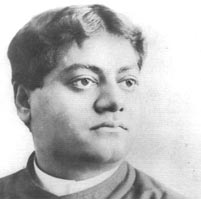Sri Ramakrishna and Swami Vivekananda
When Naren, (Swami Vivekananda ) first came to visit Sri Ramakrishna , he was not altogether impressed with what he saw. His mind doubted this perplexing, unorthodox figure. He left dissatisfied, but, at the same time he felt strangely compelled to return to visit Ramakrishna at Dakshineswar. Sri Ramakrishna, on the other hand, immediately saw in his beloved Naren, tremendous spiritual potential. After his first meeting, he predicted Naren would at one time do great things for his beloved Mother Kali.
At the time, that seemed unlikely because to some Naren appeared quite ordinary, and enjoyed debating about the existence of God. However, the faith Sri Ramakrishna had in his Naren was unprecedented. On one occasion, people started gossiping that Vivekananda had become an atheist. Ramakrishna could not bear to hear people speak ill of Naren. Instinctively he knew the accusations were false; Ramakrishna always maintained the highest faith in Naren.
Naren had tremendous aspiration and inquisitiveness, as a young man, he would ask learned spiritual men whether they had seen God. Unfortunately, he could not find anybody who could answer yes. However, the great Rishi, Debendranath Tagore replied to Vivekananda that although he had not seen God, if he wanted to meet a man who had seen God, he should go and see the Saint of Dakshineswar. When Vivekananda asked Ramakrishna, Ramakrishna replied, without any pride, false modesty or uncertainty that yes, he had seen God; furthermore, he saw God more clearly than he saw his current disciples. Vivekananda was impressed, not just with the answer, but with the unmistakable spiritual authority with which Ramakrishna spoke.
At times Naren could not understand why Sri Ramakrishna made such a fuss about him, it led Naren to rebuke Ramakrishna, "why do you give so much attention to me". Ramakrishna replied: "Mother Kali, says to pay no attention, it is only because I see God inside you…."
During his sadhana, Ramakrishna gained mastery over all the occult and kundalini powers. In all sincerity, he offered to give them to his dearest disciple. Vivekandanda’s only reply was "will these help me realise God?" Ramakrishna replied "no, they won’t, but with them you can do great works for the Mother" Vivekananda was uninterested in occult powers he replied to Ramakrishna that if they did not help him realise God he did not want them. This is an example of the sincerity, of the spiritual aspiration of Vivekananda. Like his Master, he realised outer miracles were often worse than useless; both Ramakrishna and Vivekananda wished only to use spiritual power for the inspiration of aspiring humanity.
The spiritual sadhana of Ramakrishna was extraordinary, he prayed and meditated with an unparalleled intensity and devotion. He cared not for mental learning and outer forms; Ramakrishna wished only to go directly to the source. Thus Ramakrishna was an embodiment of intuition and spiritual realisation. Despite his dishevelled looks and lack of outer education, learned scholars would come to listen at his feet. But, it was Vivekananda who was the ideal instrument for the spreading of Ramakrishna’s light in the West. Vivekananda was the messenger of Ramakrishna’s realisations. In truth, they were like 1 soul in 2 bodies.
"The Master and the disciple were hardly two distinct individuals. Each helped to shape the other. To our deeper vision, they formed an integral whole."
[1] Sri Chinmoy
Vivekananda relied on the guiding spiritual light of Ramakrishna. Ramakrishna relied on the dedicated service of Vivekananda.
When in America, Vivekananda did not once mention his Master. When asked why, Vivekananda replied that it was too difficult to do justice to the spiritual height of his Master; he worried that people would not understand and appreciate the spiritual greatness of his Master. However, in whatever he did in the West he felt the guiding hand of his Master.
"His life is a searchlight of infinite power thrown upon the whole mass of Indian religious thought. He was the living commentary to the Vedas and to their aim. He had lived in one life the whole cycle of the national religious existence in India."
Swami Vivekananda on Sri Ramakrishna [2]
Links
Mano Chalo First Song by Swami Vivekananda sung to Sri Ramakrishna at Dakshineswar.
Vivekananda speaking at World Parliament of Religions
Ramakrishna Soul of the East
References
[1] Vivekananda Heart Life
[2] Ramakrishna – Vivekananda
 Swami Vivekananda was a close disciple of the great spiritual Master Sri Ramakrishna. After Ramakrishna’s passing, Vivekananda began a whirlwind of activity. He travelled across India, United States and Europe – giving lectures on Vedenta, philosophy and encouraging dynamic action – especially in India. Towards the end of his short life, his hectic schedule told on his health and he retreated to the Himalayas to spend more time in quiet contemplation.
Swami Vivekananda was a close disciple of the great spiritual Master Sri Ramakrishna. After Ramakrishna’s passing, Vivekananda began a whirlwind of activity. He travelled across India, United States and Europe – giving lectures on Vedenta, philosophy and encouraging dynamic action – especially in India. Towards the end of his short life, his hectic schedule told on his health and he retreated to the Himalayas to spend more time in quiet contemplation.

